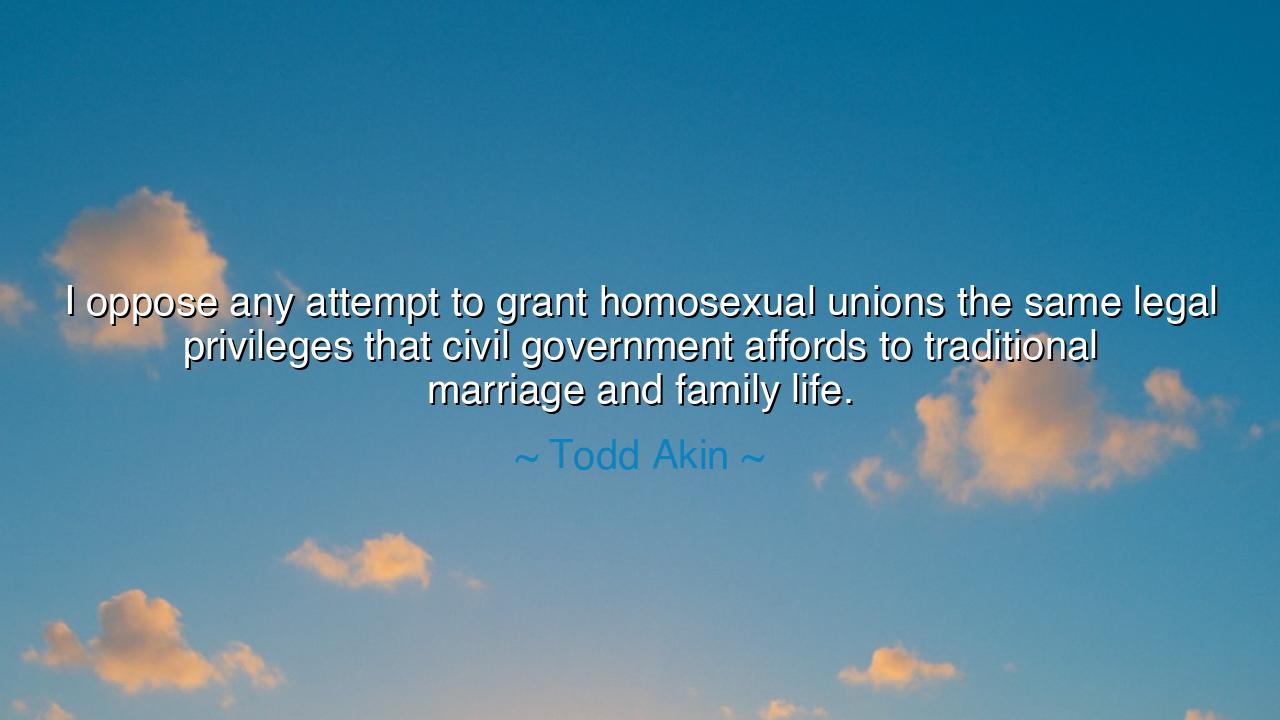
I oppose any attempt to grant homosexual unions the same legal
I oppose any attempt to grant homosexual unions the same legal privileges that civil government affords to traditional marriage and family life.






When Todd Akin declared, “I oppose any attempt to grant homosexual unions the same legal privileges that civil government affords to traditional marriage and family life,” he spoke from a conviction rooted in a particular vision of morality, tradition, and social order. His words emerge from a long-standing debate at the heart of human civilization — the question of what constitutes marriage, and who has the authority to define it. To understand the depth of this statement, one must look not only at the politics of his era but also at the enduring tension between custom and change, between the sacred and the secular, between law and conscience.
The origin of this quote lies in the early 21st century, a time when the United States and much of the world were grappling with the transformation of social norms. In those years, discussions surrounding same-sex marriage divided communities, families, and faiths. Akin, a conservative congressman from Missouri, represented a generation of leaders who viewed traditional marriage — the union of man and woman — as not merely a social arrangement but the foundation of civilization itself. To him, altering that definition threatened the very moral fabric upon which the legal and spiritual life of the nation was built. His statement was both a declaration of belief and a warning against what he saw as the erosion of societal pillars established over millennia.
To the ancients, marriage was not only a bond of affection but a covenant with purpose — the joining of man and woman for the creation and nurturing of life, and for the preservation of order within the community. In societies from ancient Greece to Rome to Israel, the institution of marriage was seen as the microcosm of the state: where the home flourished, so did the nation; where it faltered, chaos entered. Akin’s resistance to extending marriage’s legal privileges to other forms of union thus reflected an ancient fear — that when the definition of the family shifts, the meaning of civilization itself may begin to blur. Whether one agrees with him or not, his stance carries the tone of those who believe they are standing guard at the gate of tradition, defending the known against the tide of the new.
Yet history teaches that moral order has never remained static. In every age, new realities arise that test the endurance and flexibility of tradition. When Christianity spread through Rome, it upended the old pagan family structure, placing love and fidelity above mere inheritance and property. When slavery was abolished, old laws were shattered to make room for a deeper sense of justice. And in more recent times, societies have had to reconcile ancient moral codes with modern understandings of human dignity. Those who resist change often do so not from hatred, but from fear — fear that in the pursuit of progress, something sacred will be lost. In this way, Akin’s words can be seen not as mere political rhetoric, but as a cry from the guardians of the old order, uncertain of how to preserve what they hold dear in a world that no longer stands still.
Still, the course of history has always moved toward the expansion of human rights and recognition of shared humanity. While Akin viewed legal privileges as belonging solely to traditional marriage, others saw equality before the law as an extension of justice itself — the same justice that once broke chains, enfranchised the voiceless, and brought inclusion where exclusion reigned. Thus, his quote stands at a crossroads of worldviews: one seeking to preserve continuity and sacred heritage, the other seeking to fulfill freedom’s promise by ensuring that love, too, has its dignity recognized.
In this clash between permanence and change lies a truth both sides must acknowledge: that law and love must coexist, and that a nation’s strength lies not in uniformity but in its capacity to wrestle with truth. Akin’s warning about legal privileges reflects the ancient belief that once the law is changed, the culture follows. And perhaps that is true — but culture has always evolved, shaped not by decree alone but by the living experiences of the people. The challenge, then, is not to choose between tradition and progress, but to ensure that in choosing either, virtue and respect do not perish.
Let the lesson of this debate be this: every generation must face its own moral storms. Whether one stands with Akin’s defense of tradition or with those who fought for equality, what matters most is that we approach such conflicts with wisdom, humility, and reverence for truth. For history will not only remember what we believed, but how we treated one another in the heat of belief. The ancients would counsel this — to speak one’s conviction boldly, yet to temper it with compassion; to guard what is sacred, yet to see that justice, too, is sacred. Thus may every person, whether rooted in faith or driven by freedom, build not division but understanding — and through that, preserve both the heart of tradition and the spirit of humanity.






AAdministratorAdministrator
Welcome, honored guests. Please leave a comment, we will respond soon